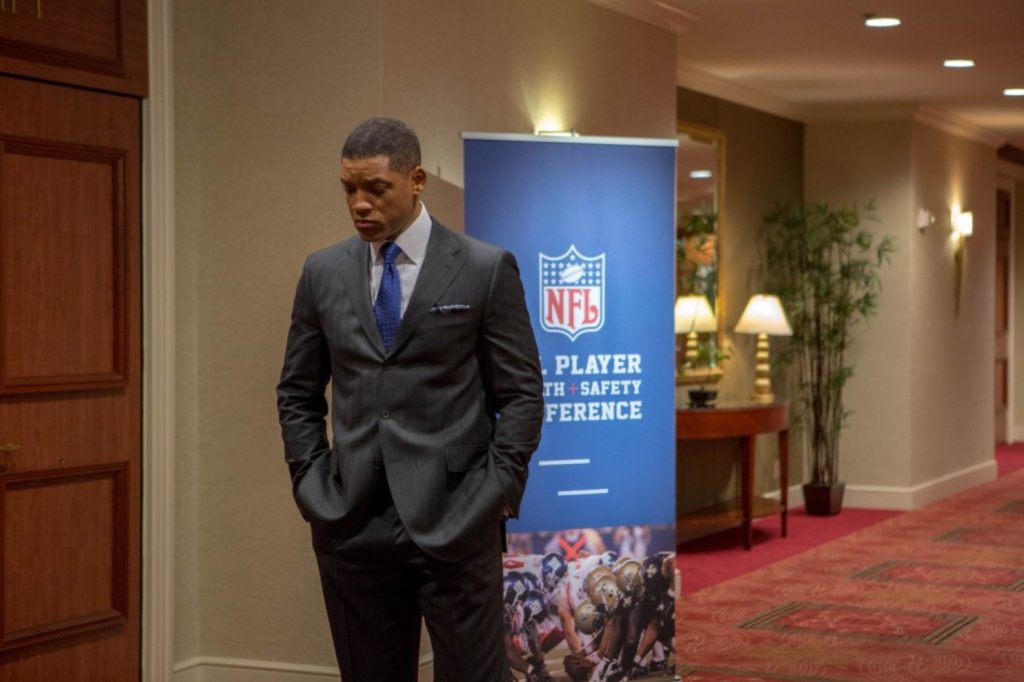Football is the national pastime. Sure, baseball holds the name, but only football has the publicity, the ads, and the notoriety that captivates America year after year. In many ways, autumn is no longer fall, but football season.
While people have been familiar with boxing’s ‘punch drunk’ syndrome for years, CTE, or ‘Chronic Traumatic Encephalopathy’ didn’t get much attention at first, even amidst the chagrin of its founder, Bennet Omalu. However, a multitude of NFL player deaths, along with the eventual publication of books and articles on the topic, would bring to light the condition, which rendered men in once great health to elderly Alzheimer’s patients. Now this Christmas we have “Concussion,” a film based on Omalu’s discovery and the backlash it proffered. And lined with powerful material and performances, the film is decidedly worth the effort.
Omalu is a Nigerian immigrant, brought to life here by Will Smith. We see from the start what kind of man he is: a driven professional who gives his all to his endeavors. He’s called to testify in court, convincing, with scientific proof, that a suspect could not have killed the victim because with his condition, hemophilia, he would have surely bled to death if he had been scratched in self-defense. He’s also a pathologist, his job to determine not how a person lived, but how they died. He’s good at what he does, delving into a person’s life to determine their death, even taking to talking to the corpse aloud during autopsies, which angers a fellow pathologist. However, it’s not strictly his work ethic that brings Omalu’s work into question: a foreigner believing in the American Dream, we see how Omalu’s immigrant status comes into play.

“Concussion’s” tone is grim, and is presented wonderfully by Director/Writer Peter Landesman. The film is led by Smith and his mentor, Cyril Wecht (Albert Brooks), as we get a crash course on pathology, medicine, and traumatic brain injuries. “Repetitive head trauma chokes the brain,” Omalu asserts, adding without thought, “God did not intend men to play football.” The whole thing is presented from Omalu’s outsider’s view, from his distaste for even having a television in his home, to ignorance of football as he asks, before performing an autopsy on a NFL player, ‘who is Mike Webster?’ – though the entire city of Pittsburgh, from its CEOs down to its blue collar workers, worshipped the footballer dubbed ‘Iron Mike.’
The performances here are mostly top of the line. Smith absolutely dissolves into Bennet Omalu, showcasing a performance we haven’t really seen since his nominations for the films “The Pursuit of Happyness” and “Ali” respectfully. His accent feels authentic, his slow, purposefulness of speech adding to his character in unique ways to make us believe this man came from Nigeria in pursuit of the American Dream. But, like the thoughtful “Lincoln,” “Concussion” is not about Smith’s performance, not built around him as Oscar fodder. The film presents the topic seriously, morosely, and carefully, with Omalu a voice for football’s unsung victims. Losing much during “Concussion’s” run-time, Smith brings the right amout of naïve good intentions and despair to Omalu’s character to make the portrayal nothing if not powerful.
 He’s aided by others, such as Albert Brooks, who I’ve liked ever since “Drive,” and here turns in another wonderful performance, neither overshadowing Smith nor disappearing into the shadows. He’s a believable mentor to Omalu, pointing him in the right direction. “Sometimes you’re asked to leave it alone,” he cautions, then ads: “I never leave it alone. That’s why everyone hates me.” We also see despairing yet spot-on portrayals of several football players such as Mike Webster (played by David Morse), and Dave Duerson (Adewale Akinnuoye-Agbaje). Rounding out the cast, Gugu Mbatha-Raw plays Omalu’s wife, and Alec Baldwin shows up as a former NFL doctor with a story to tell. Luke Wilson also makes an appearance as NFL commissioner Roger Goodell, but is mostly lost amidst the noise.
He’s aided by others, such as Albert Brooks, who I’ve liked ever since “Drive,” and here turns in another wonderful performance, neither overshadowing Smith nor disappearing into the shadows. He’s a believable mentor to Omalu, pointing him in the right direction. “Sometimes you’re asked to leave it alone,” he cautions, then ads: “I never leave it alone. That’s why everyone hates me.” We also see despairing yet spot-on portrayals of several football players such as Mike Webster (played by David Morse), and Dave Duerson (Adewale Akinnuoye-Agbaje). Rounding out the cast, Gugu Mbatha-Raw plays Omalu’s wife, and Alec Baldwin shows up as a former NFL doctor with a story to tell. Luke Wilson also makes an appearance as NFL commissioner Roger Goodell, but is mostly lost amidst the noise.
“Concussion” is not a football movie, but a human one. It paints its victims as just that, victims, words not often used to describe football’s greats. It echoes the horrors of football’s ‘patch ‘em up’ mentality, seen in movies like “Varsity Blues,” or documentaries such as “Schooled: The Price of College Sports,” while also showing the glory and hope football’s heroes brought to cities like Pittsburgh during tough times.
There’s a great shot in this film, of Omalu walking up the locker room steps to the stadium, his shadow cast down the stairs like so many a football hero movie has done before. Is he a hero? Maybe/maybe not. Unchecked progress is often an anthem of our money-driven world. With great performances and a focused lens, “Concussion” asks us to maybe slow down every so often and ask about the consequences.


